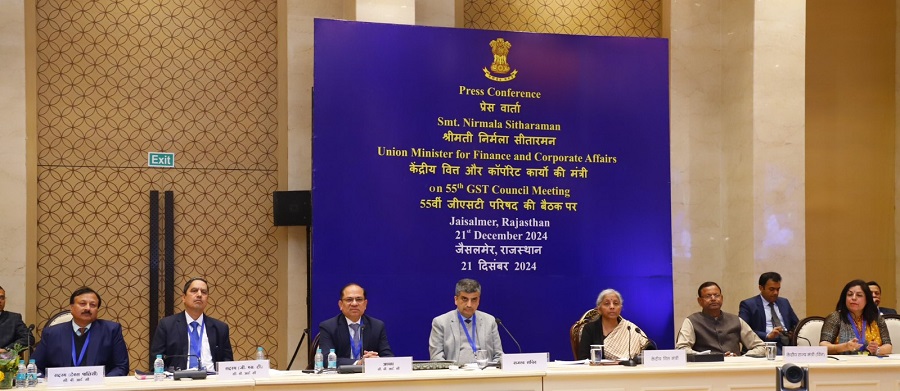Jaisalmer, Rajasthan – The 55th meeting of the Goods and Services Tax (GST) Council, chaired by Union Minister for Finance and Corporate Affairs, Nirmala Sitharaman, took place on December 21, 2024. Convened in the scenic city of Jaisalmer, the council discussed and approved several critical reforms aimed at refining tax structures, providing financial relief, and enhancing trade facilitation.

Major Changes to GST Rates on Used Vehicles
One of the key highlights of the meeting was the recommendation to increase the GST rate from 12% to 18% on the sale of old and used vehicles, including electric vehicles (EVs), except for specific vehicle categories already taxed at 18%. This change primarily impacts:
- Petrol vehicles: Engine capacity of 1200 cc or more and length exceeding 4000 mm.
- Diesel vehicles: Engine capacity of 1500 cc or more and length exceeding 4000 mm.
- SUVs: Vehicles falling under the specified SUV parameters.
It was clarified that GST will apply only to the margin between the purchase and selling price of such vehicles. This ensures that the tax burden is fair and targeted, sparing unregistered persons from its application.
Relief Measures for Motor Vehicle Accident Victims
In a significant move, the GST Council approved a complete exemption on GST for contributions made by general insurance companies from third-party motor vehicle premiums to the Motor Vehicle Accident Fund. This fund, established under Section 164B of the Motor Vehicles Act, 1988, provides vital support for victims of road accidents, including cashless treatment and compensation in hit-and-run cases.
This exemption is expected to streamline the financial support mechanism for accident victims and enhance the operational efficiency of the fund.
Streamlined Compliance and Trade Facilitation
The council also discussed measures to simplify GST compliance, emphasizing technology integration and policy updates to improve ease of doing business. While the specific details of these measures were not disclosed during the meeting, the intent to promote trade facilitation was a consistent theme.
Looking Ahead
The recommendations from this landmark meeting reflect the government’s commitment to balancing revenue generation with economic and social welfare. With these changes, the GST Council continues to adapt to evolving economic landscapes while addressing pressing public concerns.
As the proposals move toward implementation, industry stakeholders and citizens alike will closely monitor their impact on sectors such as the automobile market and insurance. For now, the council’s decisions underscore its proactive approach to tax reform and societal benefit.




